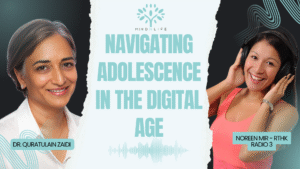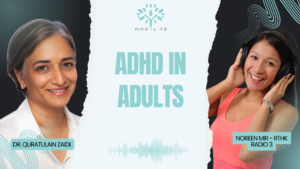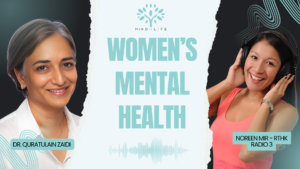Women’s bodies go through many changes biologically, hormonally, and psychologically, from menstrual cycles to pregnancy, to childbirth, to the physical limits of postpartum, and more, women’s bodies are constantly changing and evolving to adapt to new chapters in life.
Menopause has long been seen as a taboo subject related to the shame of aging. However, menopause should be treated with compassion and empathy as it has many difficult implications for a woman’s physiology and biology, as well as having a huge impact on their mental health, relationships and often impacting the functioning of the whole family.
From hormone levels and bodily changes, menopause can wreak havoc on a woman’s emotional and mental state. So, what causes this? Over the past few years, we’ve seen an increase in conversations and available information, but there is still work to be done on raising awareness, removing stigmas, helping women understand what is happening to their body at this stage of life, and what they can do to take charge of it.
Perimenopause and Menopause Explained
Menopause is defined as when your period has stopped for a year and you’re no longer able to release an egg; at this time, you experience a shift in three important hormones: oestrogen, progesterone and testosterone. Endocrinologists say that it’s the fall in oestrogen that brings on most of the common symptoms experienced by women.
Perimenopause, also known as menopause transition, is the stage of a woman’s reproductive life that begins several years before menopause, as their ovaries gradually begin to produce less oestrogen. For some women, it can start as early as late 30s – and it can last over a decade. This stage of life doesn’t arrive at the best time, often happening when women are at the peak of their careers with busy home lives and young families.
Perimenopause can mark the start of a complicated relationship with your body. Although every woman experiences menopause differently, research shows that medical care all over the world often fails to provide them with treatment that could alleviate their symptoms. Research also suggests that 70 to 80 percent of women experience menopause symptoms, and more than 25 percent of the time they are debilitating.
Common symptoms of perimenopause
- Loss of libido
- Migraines
- Mood changes
- Depression or anxiety
- Transient memory loss “Brain fog”
- Weight gain
- Hot flushes and night sweats
- Insomnia
- Breast tenderness
- Itchy, crawly or dry skin
- Exhaustion
- Irregular periods
- Vaginal dryness
On average, these symptoms last for seven to fourteen years; yet doctors often encourage women to “grin and bear it”. I was certainly told as much in Hong Kong: I was told nothing helps and I would just have to live with it. At that point, I gave up hope and thought I would never have clarity of mind again. And, while some doctors may prescribe antidepressants to help with depression symptoms, it’s nowhere near enough as it’s not treating the cause of the problem.
While so often menopause is talked about in terms of physical changes, mental health struggles are more often common, especially for those who have had mental health challenges previously who are often at a higher risk of going through higher levels of mental health issues due to this change.
Physical changes impact our emotional state
During menopause, it’s incredibly common for a woman to experience fatigue, night sweats, insomnia, tension, and stress all contributing to emotional impairment. In addition, the added mental burdens of feeling irritable, exhausted, unmotivated, sad, and even aggressive all play a role in the emotional dysregulation during menopause.
While the sudden shifts in hormone levels, physical body changes, and sleeping difficulties all contribute to mental health problems in older women, life factors during this transitional period play a role as well.
Children leaving the home, romantic relationships, financial or career changes, and health problems associated with ageing all can cause depression and anxiety in women going through menopause.
Let’s look at a few of the most common mental health conditions and their link to menopause.
Menopause and Depression:
While a great deal of research still needs to be conducted linking depression and menopause, it’s obvious as to why many of these mental and physical changes can cause a woman to begin to feel depressed during this time.
Women may be incredibly vulnerable during the menopause and pre-menopause years, setting them up for increased sensitivity related to hormone shifts, as well as difficulty incorporating much-needed self-care while balancing children, finances, and a career.
For women experiencing greater fluctuations in hormone levels, particularly oestrogen, their risk for depression was much higher than women who only had mild menopause symptoms.
Menopause and Anxiety:
While the link between menopause and depression makes sense, it’s not as crystal clear when it comes to menopause and anxiety.
Panic attacks (defined as short periods of extreme fear and anxiety followed by hyperventilation, shortness of breath, chest pains, sweating, and trembling) have been seen in women going through menopause.
However, some researchers believe women may be incorrectly identifying their panic attacks as a common symptom of menopause – hot flashes.
While these two can look alike it’s important to tell the difference to get help if you need it. A panic attack may feel like:
- Racing or irregular heartbeat
- Sudden extreme fear
- Chills
- Shaking
- Difficulty breathing
- Tingly or numb hands
- Nausea
- Inability to calm down without coping strategies
Menopause and Bipolar Disorder:
While menopause doesn’t directly cause bipolar disorder it can certainly exacerbate the symptoms of a woman who has previously experienced bipolar.
Women who have chronic bipolar disorder are far more sensitive to the hormonal and mood swings found when oestrogen levels drop during menopause. In addition, women who already suffer from bipolar disorder may experience lower “lows” as they may struggle with greater depression during this time (due to a decrease in the hormone oestrogen).
Research on this topic is murky as a large majority of women experience extreme changes in mood during menopause. It’s yet to be firmly determined whether these intense highs and lows are from late-onset bipolar disorder or from menopause itself.
Mental Health and Menopause: Final Thoughts
Approaching middle age can bring about many different stressors. From becoming an ‘empty nester’ to newfound physical limitations, to losing older family members. This time is by no means easy, and many women suffer in silence assuming this is how the rest of their life is going to be.
The changing levels of oestrogen progesterone and testosterone contribute to a wide variety of both physical and emotional issues in women resulting in sleep disturbances, hot flashes, weight fluctuations, irritability, fatigue, depression, and anxiety.
Take the extra step
It’s also essential to remember that, while there are medical options for women suffering through perimenopause and menopause like the HRT and the availability of female testosterone there are other key things you must do to enhance your quality of life at this time.
#1 Educate yourself
Being aware of what’s going on for you biologically is important; reaching out for help and knowing that you are not alone is helpful.
#2 Practice self-care
Self-care is important during this period. This can include changing your diet, looking after your emotional and physical wellbeing, exercising and managing your sleep routine well.
#3 Look at the options for psychological support
Cognitive Behavioural Therapy (CBT) is known to be an effective therapeutic treatment and seeking help for any mental health challenges can be useful.
#4 Social support
Having an open and honest discussion with family members and creating a support network by reaching out to groups of women who may be going through similar challenges is helpful. It’s important to know you have options and that your quality of life can be improved significantly. Also, you have to know the risks and benefits of the treatments that are available so you can make informed decisions.
It’s imperative to find trusted, experienced, and competent professionals who will listen and guide you safely through this challenging life stage and make it easier. It’s a life stage that doesn’t have to be so hard for women – trust me, as with so much else that comes with being a woman, you don’t have to grin and bear it. Ageing and menopause are simply part of life. While they may not be easy concepts to manage, remember that these symptoms are temporary. They won’t last forever.







